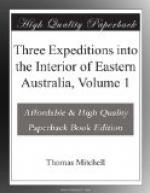January 21.
The cattle being much fatigued by incessant travelling during great heat I left most of them at this camp with Mr. White and half the men of the party, and I crossed the river with the other portion and some pack-animals carrying a small supply of provisions, some blankets, etc. The river was accessible to the cattle at only one place, the muddy bank by the water’s edge being so soft that they were everywhere else in danger of sinking; the men were therefore obliged to carry the packages across and load the animals on the opposite bank. This work was completed by ten A.M. and we proceeded due north from the depot camp. We soon saw a flock of eight emus. The country consisted of open forest which, growing gradually thinner, at length left intervals of open plain. The ground seemed to rise for the first mile, and then to slope northward towards a wooded flat which was likely to contain water, although we found none there. Penetrating next through a narrow strip of casuarinae scrub, we found the remains of native huts; and beyond this scrub we crossed a beautiful plain; covered with shining verdure, and ornamented with trees which, although dropt in nature’s careless haste, gave the country the appearance of an extensive park. We next entered a brush of Acacia pendula, which grew higher and more abundant than I had seen it elsewhere.
A NIGHT WITHOUT WATER.
After twelve the day became excessively warm, and although no water could be found we were compelled to encamp about two P.M., one of the party (Burnett) having become seriously ill. As the country appeared to decline towards some wooded hollows I hoped that one of these might be found to contain a pool, especially as the wood appeared to consist of that species of casuarina which, in the colony, is termed swamp-oak, and which usually grows in moist situations. Subsequent experience however proved quite the reverse; for, on exploring the deepest hollows and densest thickets about our camp, not a hollow containing the least moisture could be found. Thus the cattle were compelled to endure this privation once more, after a hard day’s work, and during an unusually hot evening.
MAN LOST.
To add to our distress The Doctor, as Souter was termed by his comrades, having, as soon as we halted, set out in search of water, with the tea-kettle in his hand, did not return.
When the sun had nearly set a black swan was observed high in the air, slowly winging its way towards the south-west, and many smaller birds appeared to fly in the same direction. Even the sight of an aquatic bird was refreshing to us, but this one did not promise much for the country to the northward for, at that time of the evening, we might safely conclude that the greater body of water lay to the south-west in the direction of the swan’s flight. I found the latitude of this camp to be 29 degrees 23 minutes 54 seconds South, making our distance from the camp on the river about ten miles.




